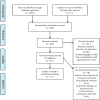Excessive Exercise-A Meta-Review
- PMID: 33329076
- PMCID: PMC7714788
- DOI: 10.3389/fpsyt.2020.521572
Excessive Exercise-A Meta-Review
Abstract
Background and Aims: While a number of studies have reported on individuals who exercise excessively, and feel unable to stop despite negative consequences, there is still insufficient evidence to categorize exercise as an addictive disorder. The aim of this meta-review is to summarize the published articles and to compile a list of symptoms reported in the qualitative literature in conjunction with excessive exercise. This list is compared with the DSM-5 criteria for gambling disorder, and initial diagnostic criteria for exercise addiction are suggested. Methods: The databases MEDLINE, Web of Science and PsycInfo were searched for qualitative studies or case reports, in which excessive exercise was the main focus. All symptoms reported in conjunction with excessive exercise were extracted from each study and documented. Symptoms were also compared to the diagnostic criteria for gambling disorder. Results: Seventeen studies were included in the review, yielding 56 distinct symptoms. The Critical Appraisal Skills Program tool showed that the majority of the studies were of acceptable quality. Exercise-related symptoms corresponded with seven of the nine DSM-5 criteria for gambling disorder. The ten suggested criteria for exercise addiction are: increasing volume, negative affect, inability to reduce, preoccupation, exercise as coping, continuation despite illness/injury, minimization, jeopardized relationships, continuation despite recognizing consequences, guilt when exercise is missed. Discussion: Our results suggest that excessive exercise may constitute a behavioral addiction, based on the criteria of the DSM-5. Conclusions: Subsequent studies should aim to systematically classify symptoms of excessive exercise; in addition, it should be noted that basic questionnaires may be need to be supplemented with detailed clinical examinations.
Keywords: behavioral addiction; diagnosis; diagnostic criteria; exercise addiction; review; symptomatology.
Copyright © 2020 Colledge, Cody, Buchner, Schmidt, Pühse, Gerber, Wiesbeck, Lang and Walter.
Figures
References
-
- Griffiths M. Exercise addiction: a case study. Addict Res.. (1997) 5:161–8. 10.3109/16066359709005257 - DOI
Publication types
LinkOut - more resources
Full Text Sources



